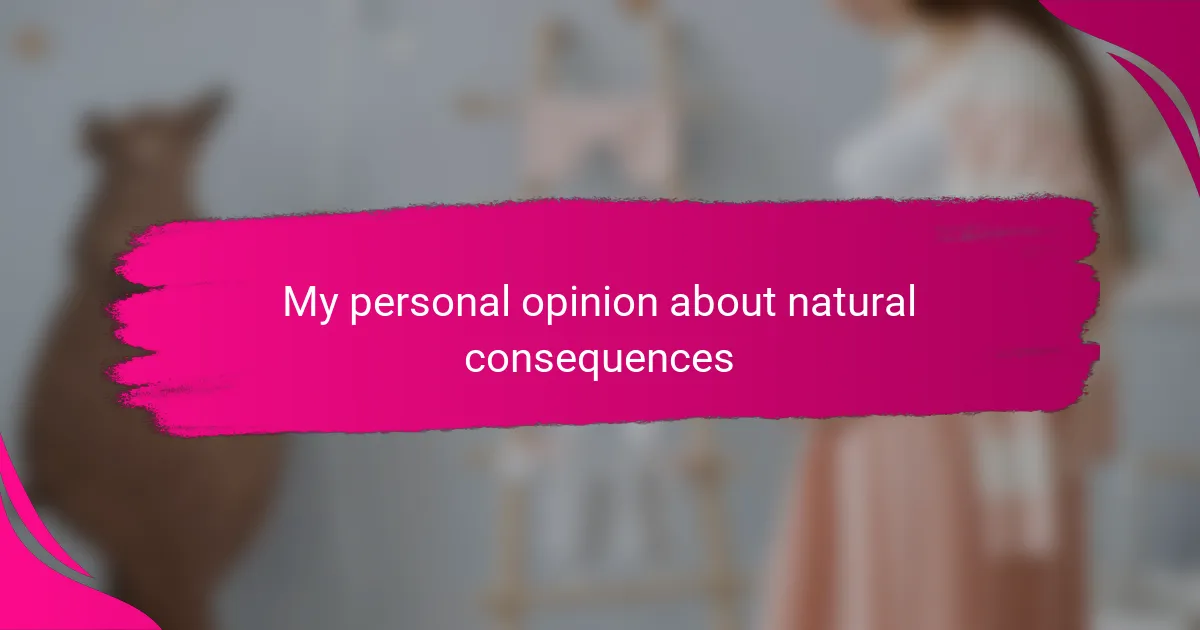Key takeaways
- Natural consequences provide valuable learning opportunities that foster responsibility and empathy in children.
- Effective implementation involves balancing support and allowing children to experience outcomes for their actions.
- Patience is crucial; lessons may take time to manifest, and gentle reminders can aid understanding.
- Every situation is unique; assessing risks and providing guidance can enhance the learning experience without undermining independence.
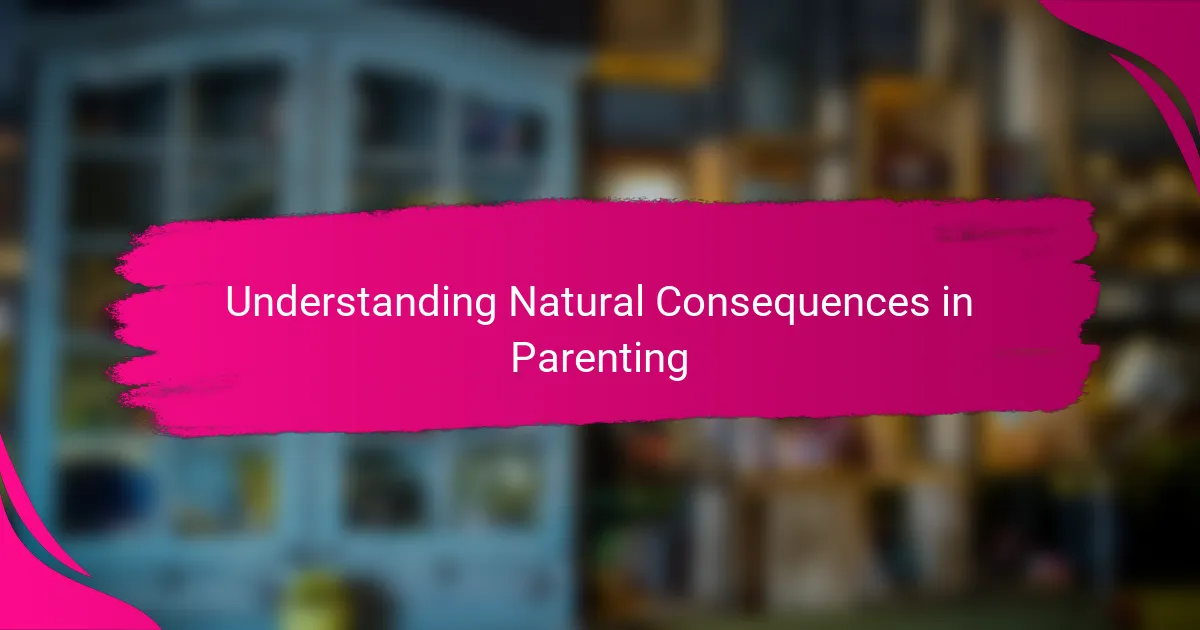
Understanding Natural Consequences in Parenting
When I first encountered the idea of natural consequences in parenting, I wondered if it meant letting kids face discomfort without interference. But I realized it’s more about creating opportunities for learning in a gentle, respectful way. Have you ever watched a child discover the result of forgetting their jacket on a chilly day? That moment, though uncomfortable, teaches more than a lecture ever could.
Natural consequences are reality’s way of guiding us, especially children, in understanding cause and effect. I remember my son dropping his toy repeatedly; instead of immediately stepping in, I let him notice that it broke. His eyes widened—not from anger, but from realizing actions have real outcomes. It was a powerful lesson wrapped in a simple moment of trust.
What’s challenging is knowing when to step back and when to step in. I’ve asked myself, “Is this consequence truly natural, or am I risking too much?” In those moments, intuition and love must guide us. Parenting isn’t about control; it’s about helping children build wisdom through their own experiences—with safety always as the top priority.
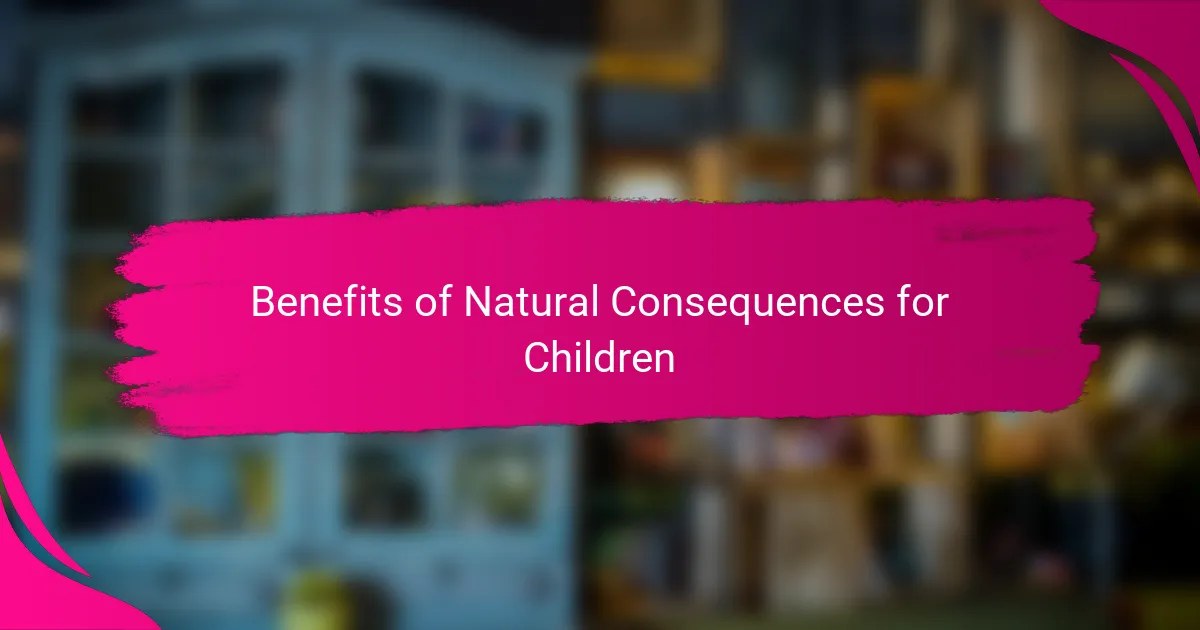
Benefits of Natural Consequences for Children
One of the biggest benefits I’ve seen with natural consequences is how they foster genuine responsibility. When my daughter left her bike out in the rain and it got rusty, she didn’t blame anyone else—she owned the mistake. That moment taught her more about taking care of her things than any reminder from me could.
Have you noticed how children who experience natural consequences often develop stronger problem-solving skills? I’ve watched my son figure out how to fix a broken toy after it got damaged. That journey from frustration to figuring things out felt like he was growing confidence with each attempt.
What strikes me most is how natural consequences encourage empathy. When kids feel the effect of their actions—like missing out on a fun outing because they didn’t finish homework—they begin to understand how choices impact themselves and others. It’s a heartbreaking but vital lesson that builds emotional maturity over time.
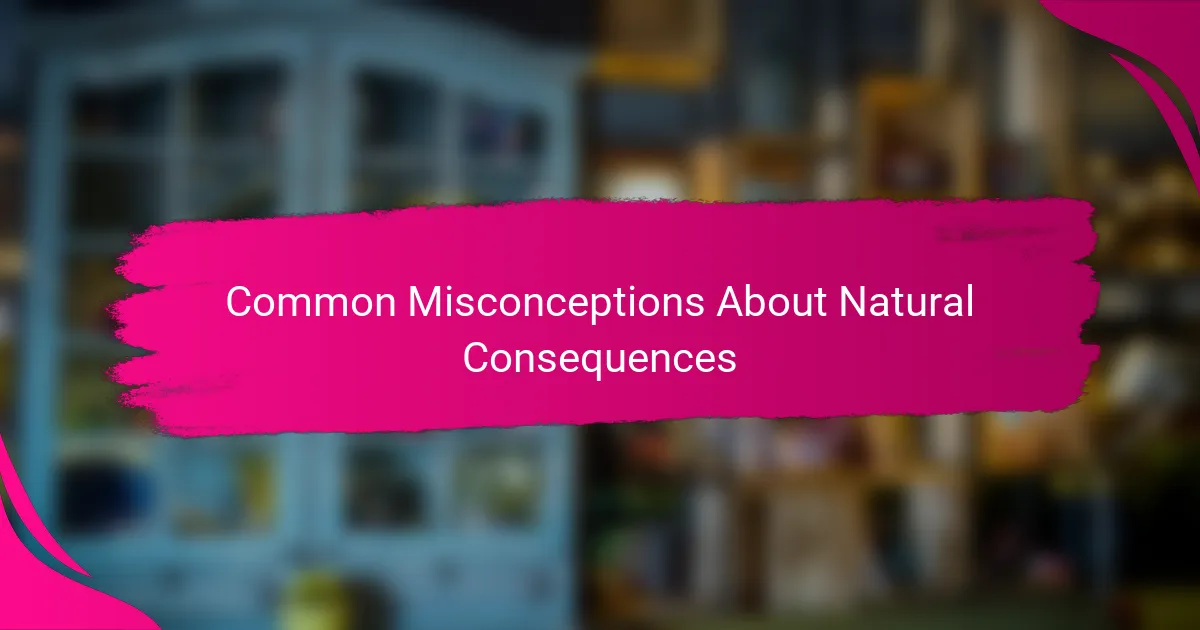
Common Misconceptions About Natural Consequences
One common misconception I’ve encountered is that natural consequences mean neglecting a child’s needs or just “letting them fail.” At first, I worried that stepping back might seem like abandoning my role as a parent. But I soon learned that it’s really about trusting children to learn while we stay close, ready to support when necessary.
Some people believe natural consequences always have to be harsh or immediate to be effective. From my experience, that’s not true—sometimes the lesson takes time to surface, like when my daughter slowly realized that ignoring her homework affected her grades weeks later. Patience, I found, is an essential part of this process.
Do natural consequences mean there’s no room for guidance? I used to think so, but now I see that setting boundaries and offering gentle reminders actually helps children connect their choices to outcomes more clearly. It’s a balance between stepping back and being present, and that balance is where real growth happens.
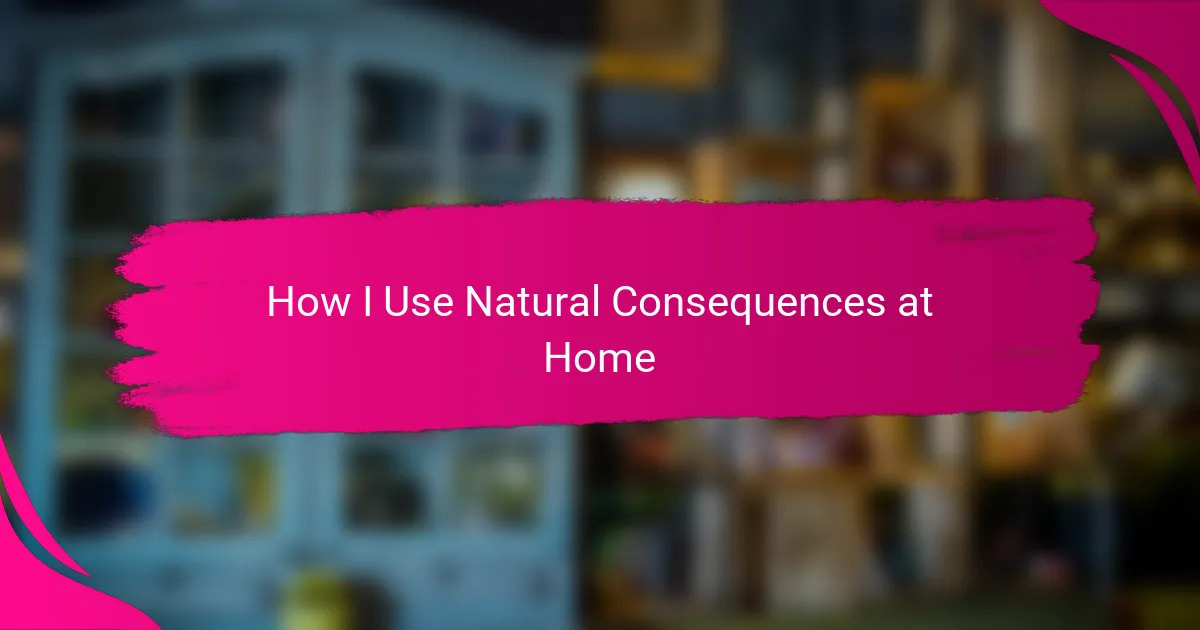
How I Use Natural Consequences at Home
At home, I try to let natural consequences do their work whenever it’s safe and reasonable. For example, when my son forgot his homework, I didn’t rush to call the teacher or make excuses. Instead, I watched how facing the immediate consequence helped him recognize the importance of responsibility without me having to remind him constantly.
Sometimes, it’s tempting to jump in and fix things quickly, but I’ve learned that stepping back allows my children to build resilience on their own. I remember my daughter once left her bike outside during a rainstorm. When it got rusty, the disappointment was real—but so was her commitment to take better care next time. Moments like that stick with them more than any lecture I could give.
Do I always get this balance right? Not always. There are times when I had to intervene because the natural consequence might’ve been too harsh or unsafe. Still, those instances remind me why natural consequences work best when paired with a parent’s presence—firm, loving, and ready to support without taking over.
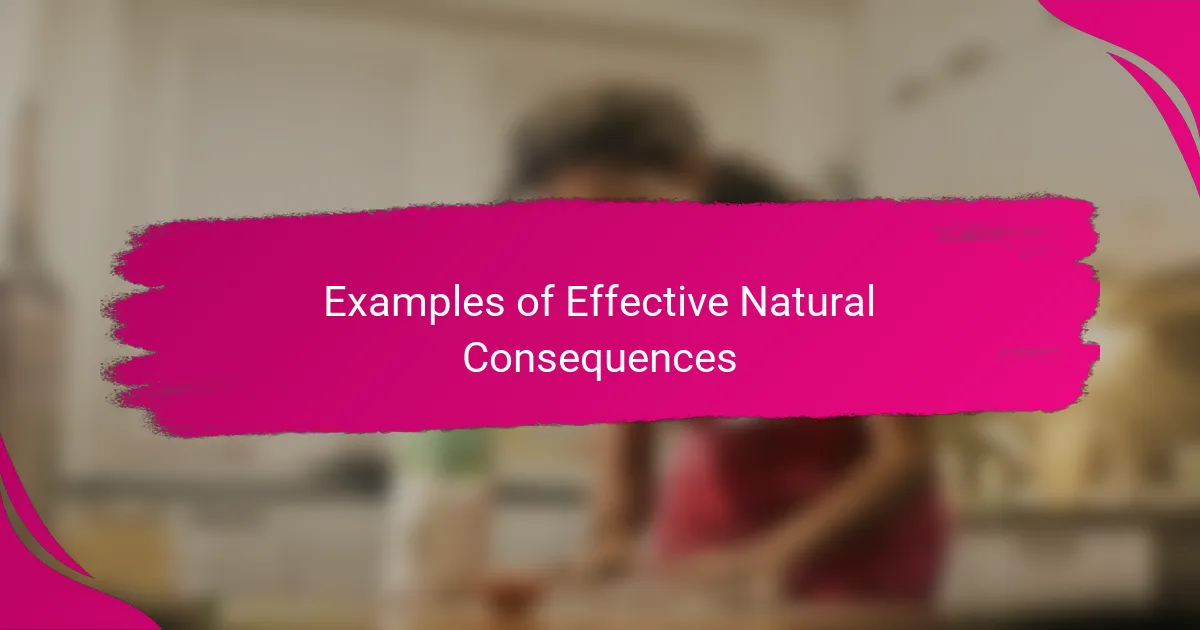
Examples of Effective Natural Consequences
One of the most vivid examples I’ve seen is when my daughter refused to wear her raincoat despite the gloomy sky. Naturally, she got soaked during recess, and though I felt a pang of sympathy, I knew this simple discomfort would help her remember next time. Have you noticed how kids rarely forget lessons learned through their own experience?
Another time, my son left his shoes scattered by the door, and when he couldn’t find them in the morning, he was late. Watching his frustration, I resisted the urge to solve the problem for him. Instead, I asked, “What can you do differently tomorrow?” That moment was a subtle but powerful way for him to connect action—and inaction—with real consequences.
Even small things, like a forgotten lunch or an uncharged tablet, can teach important lessons. I remember my daughter’s disappointed face when she realized she’d have to wait to play because her device ran out of battery. It was tough to see her upset, but that natural pause sparked a conversation about responsibility and planning that stuck with her much longer than any reminder from me.
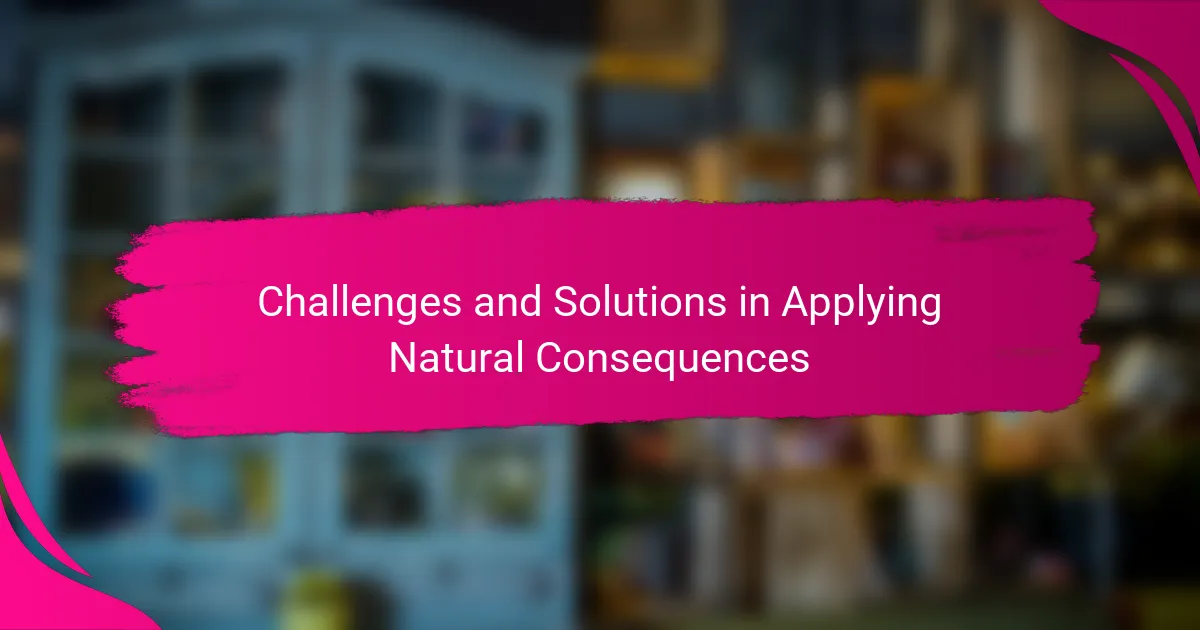
Challenges and Solutions in Applying Natural Consequences
Applying natural consequences isn’t always straightforward. I’ve faced moments when I worried whether letting my child experience the outcome might be too harsh or even unsafe. For instance, when my son was eager to try riding his bike without a helmet, I struggled internally—was stepping back responsible parenting, or was I risking his safety?
Finding the right balance takes patience and sometimes creativity. I’ve learned to assess each situation carefully and, if needed, offer a gentle nudge or set clear boundaries while still allowing the natural result to unfold. When my daughter forgot her folder repeatedly, instead of nagging, I helped her set a checklist; this small help made the natural consequence more manageable and still meaningful.
Have you ever hesitated because you weren’t sure if the consequence would teach a lesson or just cause frustration? I sure have. In those moments, I remind myself that being present to support—without taking over—is what transforms natural consequences from mere discomfort into valuable life lessons. It’s a delicate dance, but one I believe leads to stronger, wiser children.
